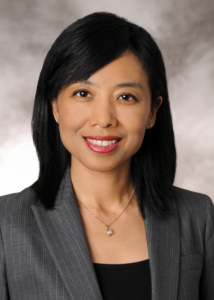 “By not telling your story, you might run the risk of creating barriers for yourself at work,” said Suzanne McAndrew, vice president of Talent Management at American Express.
“By not telling your story, you might run the risk of creating barriers for yourself at work,” said Suzanne McAndrew, vice president of Talent Management at American Express.
“That being said, you need to find the right outlets to tell your story and feel comfortable that it will then become part of what you are known for at the same time–and this can be challenging,” she continued.
Currently, McAndrew works to identify high potential talent within American Express and facilitates pathways to their success. For LGBT professionals, she advocates bringing their whole self to work, but also encourages them to define a personal brand that extends beyond their sexual orientation. “Regardless of whether you are gay or straight, you still possess skills, knowledge, and talents that make you a leader who is worthy of attention,” she explained.
Career Story
As McAndrew looks back at her career, she can separate her professional journey into three different chapters that blend the areas of service, communications and change management and talent. She started her career in retail, working in HR for Saks Fifth Avenue where she really had the opportunity to develop depth and breadth of knowledge in the area.
“I was fortunate to have a sponsor who brought me to New York to lead the corporate communications group before becoming the HR Director for Saks Off Fifth, the outlet store division of the company,” said McAndrew, who led the initiative of opening new outlet stores all over the country during her time in this role.
Before moving on to what McAndrew considers the second chapter of her career, she continued to develop her communications experience at Macy’s where she was charged with building a strong corporate communications group in addition to bolstering the company’s internal programming for employees.
Continuing to focus on communications, McAndrew took her career in a different direction when she accepted a consulting role at Towers Perrin, which later became Towers Watson. “I started as a communications consultant, but my role evolved over time to include work in the talent space and thought leadership,” she said. It was here that her relationship with American Express began as she spent eight years providing communications consulting services for the company.
“An opportunity opened up in the talent management group at American Express which involved executive talent planning, development, and assessment for the top 1,500 employees at the firm. And this is the third and current chapter in my career story,” McAndrew explained.
She is spending a lot of time right now thinking about the employee of the future and what that profile looks like. “What does the next generation of leaders look like? What motivates and drives them? How do we build a diverse talent pipeline and build inclusion into our everyday? These are ongoing questions that we have to consider while managing our current talent pool and bringing on new talent as well,” said McAndrew.
“I take a lot of pride in developing people and helping them discover and reach their full potential,” she continued. “It is rewarding to see others grow and succeed.”
Advice for Achieving Professional Fulfillment
According to McAndrew, her personal definition of success centered around the notion of finding her purpose, although this is not something she figured out until later in her career. “I wish I had been more in tune to the ‘why’ and the ‘how’ aspects of my professional development,” McAndrew noted. “I learned that having a purposeful career did not necessarily mean finding the quickest path to the top, but rather being clear on what I am aiming to achieve overall for myself, my family and the company I work for.”








